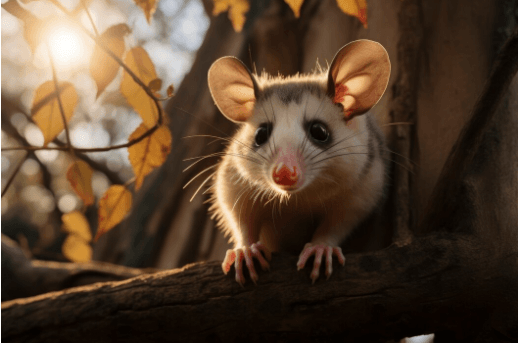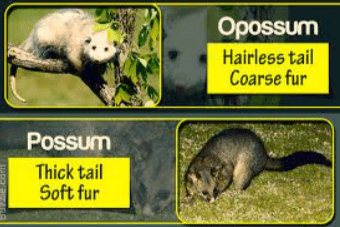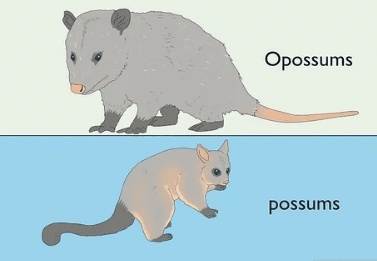Faceoff: Opossums vs Possums – What Sets Them Apart?
Contents
- Exposing Misconceptions: What is a Possum?
- Understanding The Other Side: What is an Opossum?
- Opossum Vs Possum Difference: A Comparative Study
- Say it Right: Opossum Vs Possum Pronunciation Guide
- Visual Learning: Making the Most of Opossum Vs Possum Pictures
- Why Does It Matter? The Impact Of Correct Usage
- Quick Recap
- Frequently Asked Questions

Many non-native English speakers are often puzzled by the terms 'opossum' and 'possum'. It's easy to see why such confusion arises. These creatures have similar names, and without clear visual aids, distinguishing between them can be challenging.
By using opossum vs possum images, you can quickly learn to differentiate between these two animals.
In this blog post, we'll look into opossum vs possum facts and differences. We'll also offer pronunciation tips backed by images to reinforce your understanding. So buckle up!
Exposing Misconceptions: What is a Possum?
Possums, native to Australia, are adorable marsupials with fluffy fur and long tails. Their name derives from the Aboriginal term for "white night animal".
Here are some interesting possum facts:
Possums come in 70 different species.
They have prehensile tails which they use for climbing.
Some possum species play a crucial role in seed dispersal, aiding forest regeneration.
Understanding The Other Side: What is an Opossum?
Opossums, on the other hand, are North America's only marsupial. These creatures have greyish-white bodies and long naked tails. T
Let's learn some facts about opossums:
Opossums have an average lifespan of 2-4 years.
They have 50 teeth, more than any land mammal.
An opossum's tail is hairless and acts as an appendage to hold onto branches.
Opossums play dead when threatened.
Opossum Vs Possum Difference: A Comparative Study
Understanding the opossum vs possum difference is not that big of a challenge, but a simple comparative study. Let's take a look at the following comparison table:
Attribute | Opossum | Possum |
Origin | North America | Australia |
Appearance | White or grey fur, pointy snout, hairless tail | Brown or grey fur, rounder snout, bushy tail |
Diet | Omnivorous | Primarily herbivorous |
Behaviour | Nocturnal, solitary | Nocturnal, can be social |
For example, if you see upon a creature with white or grey fur in your backyard in India or elsewhere, you've probably spotted an opossum that's strayed away from its usual North American habitat. But if you see a small, furry creature hanging from a tree in an Australian national park munching on eucalyptus leaves - that's definitely a possum!
For further clarification on similar language confusions, check out Clapingo's blog.
Say it Right: Opossum Vs Possum Pronunciation Guide
Now learn opossum vs possum pronunciation. Here is a simple step-by-step guide:
Opossum: Pronounce this as /əˈpɒsəm/; note the silent 'o' at the beginning is replaced by an 'uh' sound.
Possum: Say this as /ˈpɒsəm/, essentially the same as 'opossum' but without the initial silent 'o'.
Visual Learning: Making the Most of Opossum Vs Possum Pictures
Visual learning can be a powerful tool in distinguishing between similar-looking animals like the opossum and possum. For distinguishing between opossum vs possum, pictures of both creatures can help you identify key physical differences, aiding your understanding and correct usage of these terms.
For instance, an opossum's white face and grey body contrast starkly against a possum's darker brown hue.


Why Does It Matter? The Impact Of Correct Usage
Clarity in communication is important. Whether we're discussing animals like opossums and possums or any other specific topic, using the correct term enhances clarity and avoids confusion. If you mistakenly call a possum an opossum in conversation with someone familiar with these creatures, it could lead to misunderstandings, especially if you work in a scientific or biological field.
Moreover, mastering such specific vocabulary shows your command over English. It reflects your dedication towards understanding not just basic concepts but also intricate details of the language. This proficiency can impress potential employers or academic peers enhancing your personal brand.
Quick Recap
Let's revisit the main points we covered in this article.
We've seen a few opossum vs possum images, learned intriguing opossum vs possum facts, and distinguished between the differences and similarities in opossum vs possum features.
Mastering the correct usage of these terms enhances your English language skills and boosts your confidence. Remember, the difference lies not just in pronunciation, but also in geographical context. While 'opossums' are found in America, 'possums' in Australia (and a few other parts of the world).
For those seeking to further polish their English, Clapingo offers personalised one-on-one coaching sessions with native English speakers. These sessions are conducted in your native language to make learning more comfortable and effective. Book a quick demo today!
Frequently Asked Questions
1. What is the main opossum vs possum difference?
The primary difference between opossums and possums lies in their geographic origins and species. Opossums belong to the Didelphimorphia order found primarily in North and South America, while possums belonging to the Phalangeriformes order are native to Australia, New Guinea, Sulawesi, and other islands of Indonesia. This distinction is fundamental when differentiating between opossum vs possum facts.
2. Can I use "opossum" and "possum" interchangeably?
Technically no. While both terms refer to marsupials, they represent different animals from various regions. However, it's crucial to note that in casual speech, especially in America, 'possum' is often used as a shorthand for 'opossum'. But scientifically speaking, using them interchangeably might not be accurate given the significant opossum vs possum difference.
3. How can I correctly pronounce "opossum" and "possum"?
In terms of pronunciation, "opossum" is pronounced as /əˈpɒsəm/, with the 'o' at the beginning being silent. On the other hand, "possum" is pronounced as /ˈpɒsəm/. So one key aspect of opossum vs possum pronunciation is whether you pronounce or skip the initial 'o'.
You may want to read
How can you remove the mother tongue influencer problem in English Speaking?
Comments
Your comment has been submitted